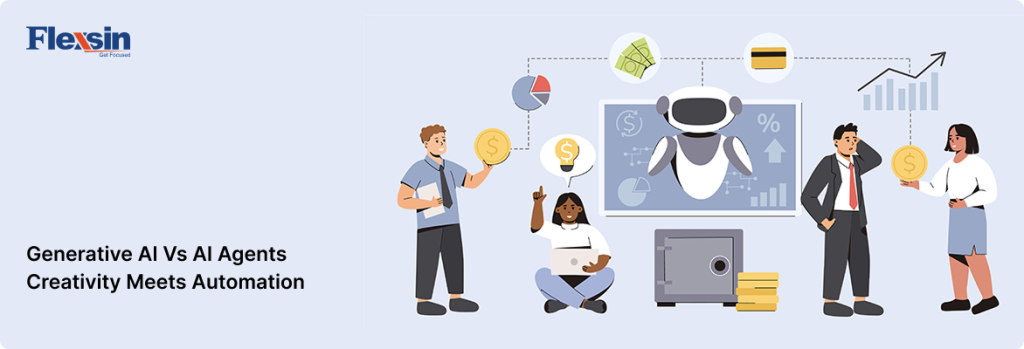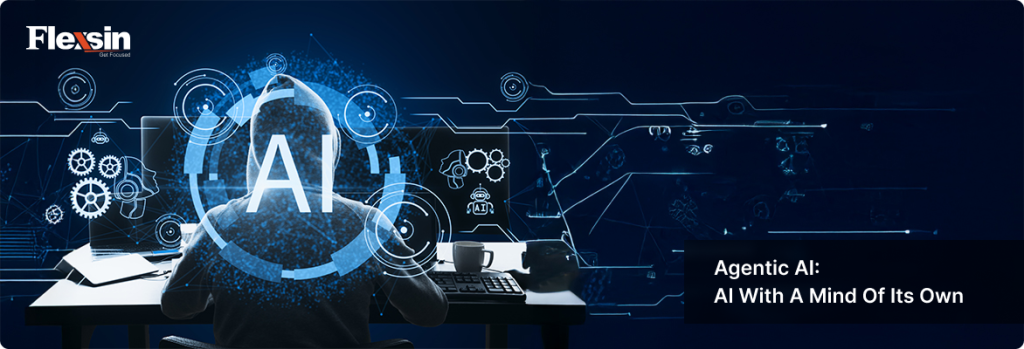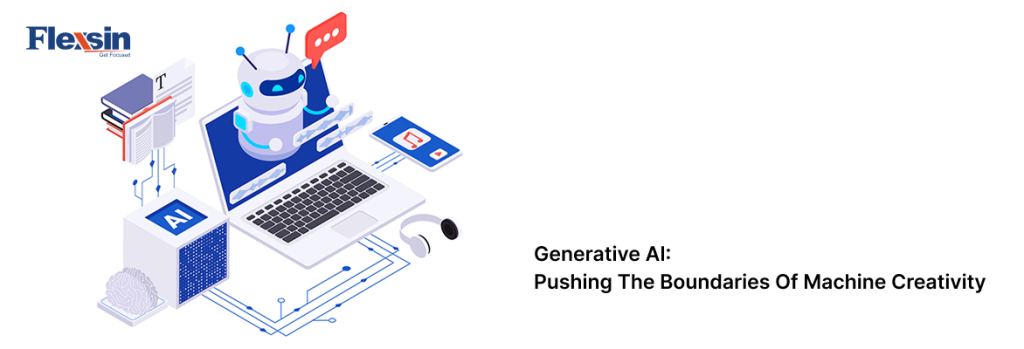Unclear of the differences and capabilities of Generative AI vs. Agentic AI vs. AI Agents, and how can they truly move the needle for your business? You’re not alone. As organizations accelerate digital transformation, executives often find themselves overwhelmed by buzzwords, conflicting definitions, and unclear ROI.
The reality is this: while Generative AI (GenAI) has revolutionized how businesses generate content, automate workflows, and unlock new customer experiences, Agentic AI and AI Agents are pushing enterprises toward the next frontier: goal-oriented automation and intelligent orchestration of tasks.
Yet here’s the challenge: How do you integrate these technologies into your business model without wasting resources or getting stuck in pilot-mode experiments? That’s where Generative AI vs. Agentic AI vs. AI Agents consulting services come in, helping businesses evaluate options, design scalable AI strategies, and overcome hurdles like integration, customization, and compliance.
1. Boosting Enterprise ROI with AI Consulting Services
Generative AI, Agentic AI, and AI Agents may sound similar, but their functions diverge significantly:
Generative AI (GenAI):
Uses large language models (LLMs) and machine learning (ML) to create new content: text, images, or code. Think of ChatGPT, Jasper, or MidJourney.
Agentic AI:
Goes beyond simple generation by introducing multi-step reasoning, reinforcement learning (RL), and workflow orchestration. It doesn’t just answer-it plans, adapts, and executes.
AI Agents:
Task-specific intelligent agents designed to automate or assist in workflows, often handling request-response models, task complexity, and decision-making with precision.
Without expertise, many businesses misapply these technologies, leading to poor scalability, compliance issues, and wasted budgets. Expert consulting helps leaders cut through the noise, ensuring the right AI model is mapped to the right business challenge.
Unlocking Business Efficiency and Cost Savings
AI consulting services don’t just educate-they deliver measurable ROI. Here’s how Flexsin has seen businesses benefit:
Cost Reduction:
Automating repetitive workflows with AI agents can reduce labor costs by 20–30%.
Conversion Uplift:
Personalized content powered by GenAI boosts engagement and increases conversion rates by up to 18%.
Faster Decision-Making:
Agentic AI improves decision cycles through intelligent automation and goal-oriented AI reasoning.
For example, one retail client used consulting-led deployment of GenAI for product descriptions, cutting content production costs by 40% while doubling output. In contrast, financial clients leveraged Agentic AI for risk modeling, gaining real-time compliance insights and avoiding costly penalties.
Key Reasons Businesses Need AI Consulting for Sustainable Growth
Why are businesses turning to consulting services instead of DIY adoption? Because AI at scale requires:
Customization:
Aligning models with domain-specific data.
Integration:
Connecting AI systems with existing ERP, CRM, or cloud platforms.
Scalability:
Ensuring that pilot successes can be replicated enterprise-wide.
Responsible AI:
Meeting compliance, ethics, and governance standards.
Without Generative AI vs. Agentic AI vs. AI Agents expert consulting, companies often end up with isolated AI experiments that fail to scale. With consulting, however, organizations achieve consistent workflows, faster adoption curves, and clear ROI tracking.

2. Solving Real-World Challenges
Adopting Generative AI, Agentic AI, and AI Agents isn’t just about deploying the latest technology-it’s about overcoming the structural and strategic barriers that often derail AI projects. Enterprises frequently struggle with integration gaps, a lack of domain-specific customization, and scaling solutions while staying compliant with regulations. This is where consulting services play a vital role: bridging the gap between technology potential and business outcomes. Let’s explore three critical challenges and how consulting services help resolve them.
Overcoming Integration and Workflow Orchestration Roadblocks
One of the biggest barriers enterprises face is integration. While AI tools like ChatGPT or Copilot are powerful in isolation, they often fail to connect seamlessly with enterprise systems such as ERP, CRM, or marketing automation platforms. Without proper integration, workflows remain fragmented, preventing AI from delivering end-to-end value.
Consulting services solve this by:
- Mapping AI to existing workflows-ensuring intelligent agents enhance, not disrupt, current processes.
- Using workflow orchestration frameworks to unify task execution across multiple tools.
- Implementing multi-step reasoning capabilities that allow Agentic AI to plan, adapt, and act beyond a single query.
For instance, a healthcare client integrated Agentic AI into its claims management system with consulting guidance. The result: a 40% reduction in processing time and improved patient satisfaction scores.
Addressing Customization and Domain-Specific AI Needs
Beyond integration, businesses also face the challenge of customization. Out-of-the-box AI models rarely meet the nuanced demands of different industries. A retail company might need hyper-personalized product recommendations, while a financial institution must prioritize compliance and fraud detection. Deploying generic GenAI or AI agents often results in inaccurate outputs and low adoption.
This is where consulting services bring critical value:
- Building domain-specific fine-tuning pipelines for LLMs.
- Leveraging reinforcement learning (RL) to continuously improve accuracy.
- Embedding responsible AI principles to align outputs with compliance regulations.
Example: A banking client used Flexsin’s consulting expertise to fine-tune GenAI models for risk assessment. Instead of generic outputs, the system delivered high-precision financial forecasts, cutting compliance risks by 25%.
Solving Scalability and Compliance Challenges
Even when integration and customization succeed, enterprises often struggle with scalability of Generative AI vs. Agentic AI vs. AI Agents. What works well in a single department can fail when expanded company-wide, especially when data privacy and regulatory standards come into play. Without a clear compliance roadmap, businesses risk penalties and reputational damage.
Consulting ensures scalability by:
- Establishing AI governance frameworks that meet industry regulations (GDPR, HIPAA, FINRA).
- Designing cloud-native architectures that allow AI agents to scale on demand.
- Creating performance monitoring dashboards to measure ROI and ensure compliance.
Take the example of an e-commerce company that tried to scale GenAI-driven chatbots across multiple regions. Without consulting, it ran into language compliance and data privacy issues. With consulting-led deployment, the company achieved global rollout with localized compliance, improving customer engagement by 33%.

3. How Enterprises Are Evolving with Generative AI, Agentic AI, and AI Agents
The adoption of Generative AI, Agentic AI, and AI Agents is no longer a theoretical exercise-it’s reshaping industries in real time. From healthcare to retail and financial services, businesses are leveraging these AI models to boost efficiency, improve customer engagement, and unlock new revenue streams. However, successful transformation doesn’t happen by chance. It requires Generative AI vs. Agentic AI vs. AI Agents consulting expertise to align AI technologies with industry-specific workflows, compliance needs, and scalability demands. Let’s break down how consulting-led adoption is driving value across different sectors.
Healthcare: Enhancing Patient Outcomes and Operational Efficiency
In healthcare, AI adoption must balance innovation with compliance. Generative AI is being used to generate clinical notes, summarize patient histories, and support diagnostic decisions. Agentic AI, on the other hand, helps with multi-step reasoning in treatment planning, while AI agents automate repetitive tasks like appointment scheduling.
Generative AI vs. Agentic AI vs. AI Agents consulting ensures that these tools integrate seamlessly into electronic health record (EHR) systems, comply with HIPAA standards, and scale without disrupting workflows. For example, a healthcare provider worked with consulting experts to deploy AI agents in claims processing, cutting administrative costs by 30% and accelerating patient reimbursements.
Retail and E-commerce: Driving Personalization at Scale
Retailers are under pressure to deliver personalized experiences at every touchpoint. Generative AI powers dynamic product descriptions and personalized recommendations, while Agentic AI orchestrates inventory management and supply chain optimization. AI agents act as digital shopping assistants, guiding customers with real-time product comparisons.
Through consulting, a global e-commerce brand fine-tuned GenAI to handle multi-language product catalogs and integrated AI agents into its customer service channels. The results were striking: a 40% increase in customer engagement and a 20% uplift in conversion rates within six months.
Financial Services: Strengthening Risk Management and Compliance
The financial sector faces high-stakes challenges-from fraud detection to regulatory compliance. Generative AI is being deployed to generate compliance reports and analyze unstructured data, while Agentic AI handles complex risk models and adaptive fraud monitoring. AI agents streamline customer onboarding, loan approvals, and credit scoring.
Consulting plays a pivotal role in ensuring these solutions align with regulatory frameworks like GDPR and FINRA, while also integrating with core banking systems. A leading bank, with consulting support, used Agentic AI to automate real-time risk assessment. This reduced compliance risks by 25% and enabled faster, more reliable credit approvals-a direct boost to customer satisfaction and trust.

4. Turning AI Potential Into Measurable Business Growth
The debate of Generative AI vs. Agentic AI vs. AI Agents isn’t about choosing one over the other-it’s about knowing how to combine them effectively to meet your organization’s unique goals. Generative AI brings creativity and scalability, Agentic AI enables goal-driven reasoning and orchestration, while AI agents specialize in task-specific automation.
Yet, the real challenge lies not in the technology itself, but in how businesses adopt and scale it. Without the right strategy, integration roadmap, and governance model, Generative AI vs. Agentic AI vs. AI Agents initiatives often stall at the proof-of-concept stage.
This is where Generative AI vs. Agentic AI vs. AI Agents consulting services prove indispensable. From customizing LLMs with industry-specific data to orchestrating multi-agent workflows and ensuring compliance across jurisdictions, consulting transforms AI adoption into a sustainable growth strategy.
Strategic Recommendations for Enterprises
- Start Small, Scale Smart: Launch pilots focused on high-impact use cases, then scale using consulting-led frameworks.
- Prioritize Compliance and Responsible AI: Build trust by embedding governance, transparency, and ethical safeguards.
- Invest in Multi-Platform Optimization: Go beyond Google SEO – optimize for AI-driven discovery on ChatGPT, Gemini, YouTube, and TikTok.
Adopt Generative Engine Optimization (GEO): Structure your content for AI engines, making it easily retrievable for AI-generated summaries and recommendations.
Measure ROI Continuously: Use consulting dashboards to track ROI, identify bottlenecks, and refine strategies in real time.
Flexsin has empowered software and hi tech leaders including AIDA Software, Sales Scripter, PapiPay and My Compliance, among others, to deploy goal driven AI agents that automate workflows and cut development lead time, while delivering precision AI at scale.
Start Your AI Transformation Today
Is your enterprise AI strategy ready for 2025 and beyond? Don’t let adoption challenges slow you down. With Flexsin Technologies, you get more than just technical expertise-you gain a partner that helps you unlock real business value from Generative AI, Agentic AI, and AI Agents consulting services.
Contact us today to schedule your consultation and start transforming your AI strategy into measurable growth.


 Munesh Singh
Munesh Singh